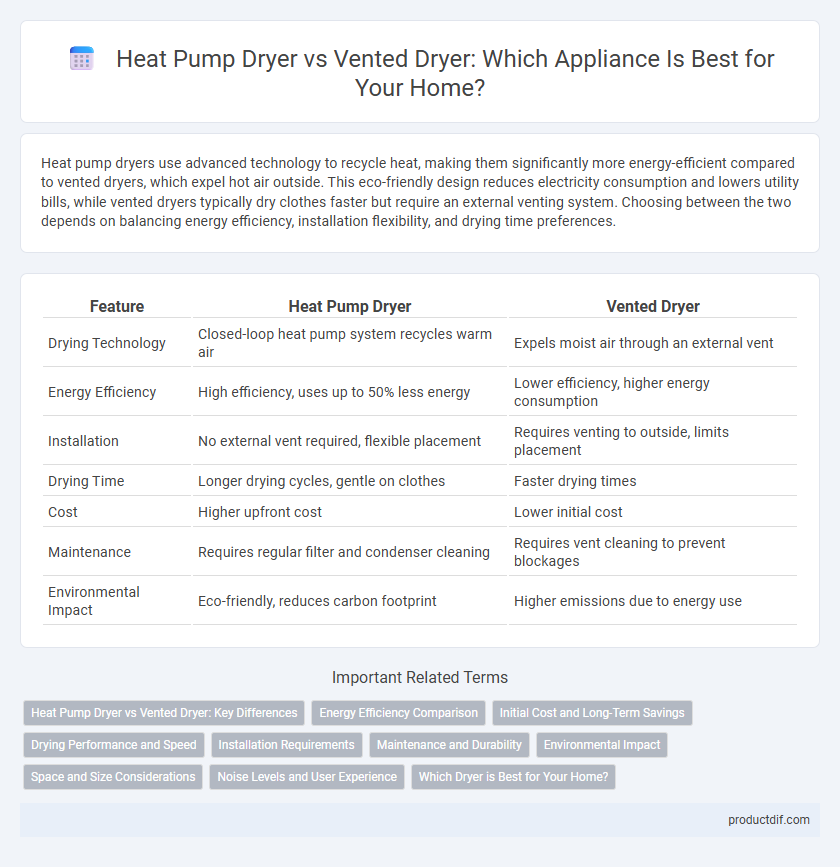Heat pump dryers use advanced technology to recycle heat, making them significantly more energy-efficient compared to vented dryers, which expel hot air outside. This eco-friendly design reduces electricity consumption and lowers utility bills, while vented dryers typically dry clothes faster but require an external venting system. Choosing between the two depends on balancing energy efficiency, installation flexibility, and drying time preferences.
Table of Comparison
| Feature | Heat Pump Dryer | Vented Dryer |
|---|---|---|
| Drying Technology | Closed-loop heat pump system recycles warm air | Expels moist air through an external vent |
| Energy Efficiency | High efficiency, uses up to 50% less energy | Lower efficiency, higher energy consumption |
| Installation | No external vent required, flexible placement | Requires venting to outside, limits placement |
| Drying Time | Longer drying cycles, gentle on clothes | Faster drying times |
| Cost | Higher upfront cost | Lower initial cost |
| Maintenance | Requires regular filter and condenser cleaning | Requires vent cleaning to prevent blockages |
| Environmental Impact | Eco-friendly, reduces carbon footprint | Higher emissions due to energy use |
Heat Pump Dryer vs Vented Dryer: Key Differences
Heat pump dryers use a closed-loop system to recycle heat, making them highly energy-efficient compared to vented dryers that expel hot air outside. Vented dryers require external venting, limiting placement options, whereas heat pump dryers operate without the need for a vent, offering greater flexibility in installation. Heat pump dryers generally have longer drying cycles but significantly reduce electricity consumption, making them more environmentally friendly and cost-effective over time.
Energy Efficiency Comparison
Heat pump dryers use advanced technology to recycle hot air, consuming up to 50% less energy compared to vented dryers, which expel moist air and require continuous heating of fresh air. The Energy Star rating for heat pump dryers generally reflects significantly lower electricity usage, making them more cost-effective over time despite a higher initial investment. In contrast, vented dryers operate at higher temperatures and shorter cycles but are less energy-efficient, leading to increased utility bills and a larger environmental footprint.
Initial Cost and Long-Term Savings
Heat pump dryers typically have a higher initial cost compared to vented dryers due to advanced technology that recycles heat for drying efficiency. Over time, heat pump dryers offer significant long-term savings by reducing electricity consumption up to 50% compared to vented dryers. Investing in a heat pump dryer maximizes energy efficiency and lowers utility bills despite the upfront price difference.
Drying Performance and Speed
Heat pump dryers use advanced technology to recycle hot air, providing efficient drying with lower energy consumption, while vented dryers rely on expelling moist air outside, leading to faster drying times but higher energy use. Heat pump dryers typically offer gentle drying that preserves fabric quality, making them ideal for delicate clothes, whereas vented dryers excel in speed, quickly removing moisture from larger loads. Consumers prioritizing energy efficiency and fabric care often prefer heat pump dryers, but those needing rapid drying may opt for vented models.
Installation Requirements
Heat pump dryers require a standard electrical outlet and do not need external venting, making them ideal for installation in apartments or spaces without exterior walls. Vented dryers demand a direct vent to the outside, requiring ductwork that can increase installation complexity and limit placement options. The non-vented design of heat pump dryers allows for more flexible positioning and fewer modifications to existing home structures.
Maintenance and Durability
Heat pump dryers require less frequent maintenance due to their sealed system and built-in filters that reduce lint buildup, enhancing durability over time. Vented dryers need regular cleaning of the vent and lint traps to prevent overheating and prolong lifespan, but they tend to experience more wear from heat exposure. Choosing a heat pump dryer typically results in longer appliance life and lower maintenance efforts compared to vented models.
Environmental Impact
Heat pump dryers consume up to 50% less energy than vented dryers by recycling heat during the drying process, significantly reducing carbon emissions. Vented dryers expel moist, warm air outside, leading to higher energy waste and increased environmental footprint. Choosing a heat pump dryer supports energy efficiency and lowers household greenhouse gas emissions, contributing to sustainable living.
Space and Size Considerations
Heat pump dryers require less space due to their compact, sealed design, which eliminates the need for external venting, making them ideal for smaller living areas or apartments. Vented dryers often demand more installation space to accommodate ductwork and proper ventilation, limiting placement options. Choosing a heat pump dryer optimizes space efficiency without compromising drying performance.
Noise Levels and User Experience
Heat pump dryers operate at lower noise levels, typically around 50-60 decibels, providing a quieter user experience compared to vented dryers that can exceed 65 decibels due to their exhaust fans. The reduced noise from heat pump dryers enhances comfort, especially in open-plan homes or small apartments where quieter appliances are essential. Users also benefit from heat pump dryers' energy efficiency and gentler drying cycle, contributing to fabric care alongside minimized operational noise.
Which Dryer is Best for Your Home?
Heat pump dryers are energy-efficient and gentle on fabrics, using lower temperatures to reduce electricity consumption and extend garment lifespan, making them ideal for eco-conscious households. Vented dryers typically dry clothes faster by expelling moist air outside but require proper ventilation and may increase energy costs, suited for homes with accessible venting options. Choosing the best dryer depends on your home's energy priorities, available space for venting, and laundry volume.
Heat Pump Dryer vs Vented Dryer Infographic

 productdif.com
productdif.com